In the future, probably Japan… Robots have long seen practical use, and shortly after, Androids come into common usage.
…Are you enjoying the Time of EVE?
Sakisaka Rikuo notices odd behaviour in his family’s housedroid. Her activity log is the first clue, with irregular movement patterns and a strange phrase in English. Rikuo and his friend Masaki trace her steps and come across a cafe hidden in a back alley. The cafe, known as The Time of Eve, has one house rule: there is to be no discrimination between androids and humans. In that cafe, both humans and androids act the same. His morning coffee is the second clue, after she switches the brand without permission. Rikuo and Masaki start to visit regularly and get to know The Time of Eve’s customers, which challenges the way they think about androids.
The sci-fi genre has long been used as a way to talk about issues in society, and sci-fi anime is no different. One of the main questions raised by The Time of Eve is ‘what is human?’. The standard definition is “relating to or characteristic of humankind”, but where exactly is the line drawn? If androids share all of the same characteristics of biological humans, where does the distinction lie? Both Rikuo and Masaki were unable to judge who was who once the visual cues were removed.
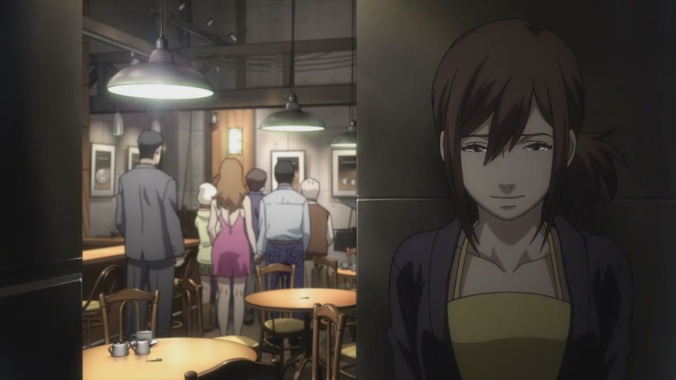
Sammy doesn’t show her halo in the cafe.
As droid technology improved, the ability to differentiate between human and robot declined. This is proved by older models such as Tex and Katoran, who are clearly not people. But they still show signs of human-like emotion, like Tex trying to protect Masaki and Katoran storing the name he was given too deep in his memory for it to be completely deleted. The outside doesn’t necessarily match the inside, but those robots are quickly written off as mere machines. This is suggests that there is a line of acceptability; it’s a lot easier for androids like Sammy to fit in with humans because she looks the part. She’s less different, and humans are known to reject that which is alien to them. In removing their halos, humanoid droids can ‘infiltrate’ the humans – something that Masaki is afraid of. But for robotic droids like Katoran, that much is impossible in regular society, so they are only treated as equals inside the cafe.
From an anthropological perspective, this is interesting, because it assumes that humans are the default that robots should aim to imitate. Yes, androids were created by humans in their own image (which by itself has religious implications), but should they be given value by how closely they copy humanoid appearances and mannerisms?
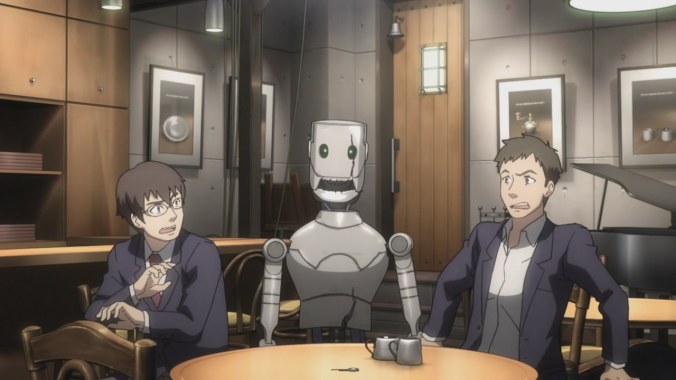
Katoran at The Time of Eve.
With androids continually growing more and more humanoid, it’s not too unbelievable that there’d be humans who’d feel emotions towards them. But droids created solely as ‘companions’ for their human owners… it’s definitely not a new concept. In reality, sex dolls already exist as an imitation of intimacy, but this takes it a step further.
In The Time of Eve, those who chose to initiate a personal relationship with a droid are ostracised, to the point of public service announcements on TV. And understandably so. After all, how much autonomy can a droid have? How much consent can a droid give with a master/servant dynamic? Can they give consent at all? I’ve mentioned this before in my review of Ghost in the Shell Innocence, where gynoids have a level of human consciousness from having the ‘ghosts’ of young girls installed into their systems. In that story, women are objectified in the most literal sense. Here, The Time of Eve doesn’t take the idea as far as Ghost in the Shell did but the same questions apply.
The people closest to Rikuo both show disdain towards people who show feelings towards robots. Naoko accuses him of being too close to Sammy. Masaki is initially angry at Koji and Rina for having an ‘artificial’ relationship, even telling them that their feelings for each other is “not love”.
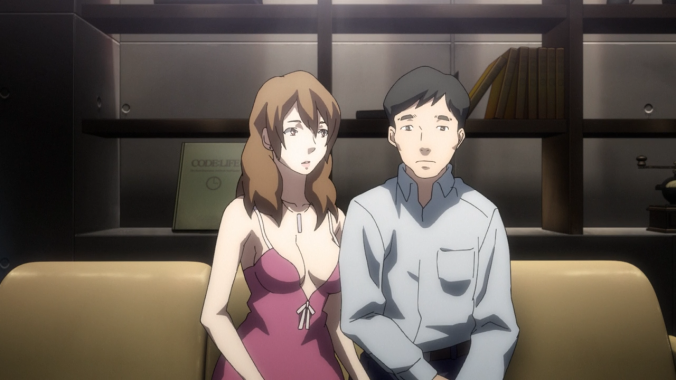
Rina and Koji.
The fear of looking like an androholic is overpowering. Humankind as a race is aggressively social, and interacting with others will always be one of our collective instincts. And those others don’t even need to be human. Historically, we’ve lived alongside animals, and domesticated some. We keep them as companions, just like the droids in The Time of Eve. Yes, animals are living, breathing things but when the androids walk and talk, it makes sense that people would become attached. And that is especially true because of how similar they look to us.
The Time of Eve may be set in the future, but it has some of the same complaints about society today. The media criticises younger generations for investing in ‘artificial’ relationships with their robots, just like millennials are criticised for turning to ‘artificial’ relationships via social media. Older generations have always shown contempt for things they don’t fully understand and it definitely looks set to continue. Millennials could very well grow older and disagree with things their children do.
The Time of Eve definitely seems like a way to talk about issues in today’s society, rather than a hypothetical look at a society that could happen.
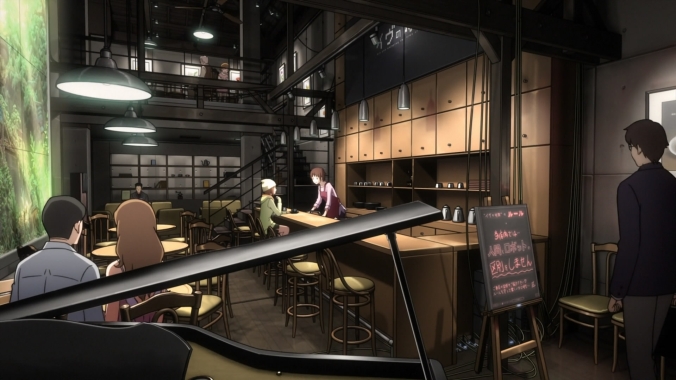
No discrimination between humans and robots.
The cafe itself is a safe space, a place for androids to live without judgement from humans, where humans can show friendliness to them without being ostracised for it.Such safe spaces exist now, with places like gay bars which have rules to prevent discrimination. Despite many people outside of the gay community saying that these places aren’t necessary, in today’s environment (and historically) they provide things that regular bars just can’t. There is no way to be a hundred percent sure that you won’t encounter prejudice in a neutral area but in a space which was specifically created to counter it, there’s a sense of security. You can meet people like you, socialise, and maybe find someone to fall in love with. There’s a higher chance of finding someone who’d be interested in a place designed for people of the same sexual orientation, so it makes sense that many gay people gravitate to them. If there weren’t issues outside of these spaces they wouldn’t be needed, but their existence proves that there’s still work to do.
And the parallels don’t stop there.
Masaki resents androids, saying that “it’s like robots are butting into everything”. This echoes the same fears about immigration; an out-group ‘invading’ and ‘stealing jobs’. Rikuo remembers his last piano recital, where he grew resentful of an android who was equally as talented as a human. He stopped playing the piano, worried that his housedroid Sammy would observe him and learn how to do it. Later he finds out that his efforts were wasted because she had been teaching herself, but that forces him to confront his fear head first. After spending time in the cafe his view of androids had shifted, and after seeing them live like humans he discovered that his concerns weren’t based on fully informed opinions. Fear of the unknown can fuel prejudice against people who are different, especially when the media portrays them as potential threats.
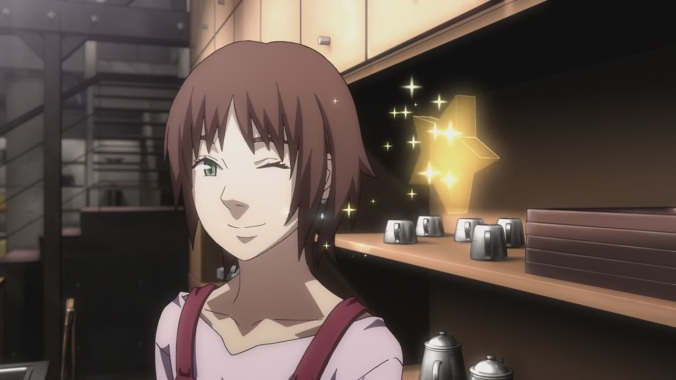
Perspective is important.
As the media cultivates a divide between ‘us’ and ‘them’, worries that the out-group will steal opportunities from the in-group gain momentum. And those worries can develop into the fear that the ‘outsiders’ will achieve more than native citizens. This happens in The Time of Eve, with Masaki concerned that androids will replace parents in childcare roles, and Rikuo concerned that androids will take over creative disciplines like music. However, they both grow to overcome their fears through exposure to a different perspective.
Sci-fi is a genre which can act as a channel to talk about racial discrimination without using real life races to make the point obvious. Using metaphorical sci-fi races as a substitute can send its message while bypassing existing prejudices. This technique is so common in fiction that the trope Fantastic Racism exists, and as far as sci-fi is concerned, this is broken down into several subtropes, like Robots Enslaving Robots and Just a Machine. Fantastic Racism affects The Time of Eve’s world, with half of the population believing that androids are ‘just machines’ and half not knowing What Measure Is a Non-Human? Robots are seen as the ‘other’, as different, alien, and even sub-human.
Both Masaki and Rikuo mirror examples of real life racism, while using the disguise of Fantastic Racism. Masaki often disregards the cafe rules for his own curiosity, observing the other customers and trying to determine their identities, despite them being uncomfortable with it and finding it intrusive. This is not dissimilar to real minorities being asked “what are you?”, having their descent questioned and comments such as “but you don’t look Hispanic”. In one episode, Rikuo explodes, claiming that everyone at the cafe hates him because he’s human. The Time of Eve is more of a safe space for androids than humans, as in a society where droids are treated as less, the cafe is where they can be treated as equal. Humans could mistake that as them being ‘downgraded’ to the android level, rather than the androids being ‘upgraded’ to the human level. Rikuo definitely does this, and doesn’t acknowledge the fact that he comes from a more privileged position in society.
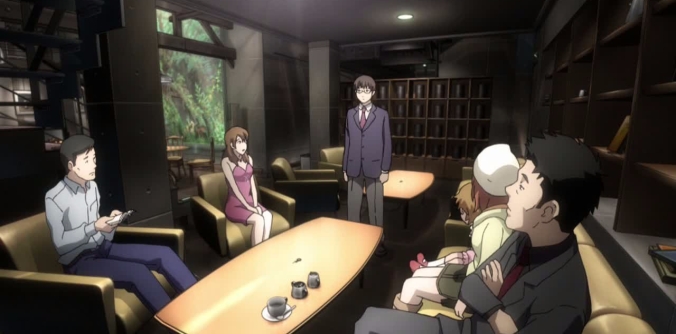
Rikuo is uncomfortable.
Equality can be misinterpreted as ‘taking away’ from the more privileged group rather than ‘giving more’ to the less privileged, which is why in real life, bursaries to encourage less fortunate black children to go to college can be viewed as favouring them over white children, despite white children already being more likely to go into higher education. This is just one example, but there are other similar instances. In The Time of Eve, Rikuo is basically accusing the cafe’s customers of ‘reverse racism’, However, the androids in The Time of Eve cannot be racist against humans, because racism relies on the social power they’d gain from their prejudice. In terms of Fantastic Racism, the androids have nothing to gain from hating humans, just as real minorities have nothing to gain from hating the majority race, whereas the dominant group can keep their position of power by being prejudiced against minorities.
In summary, sci-fi and fantasy can act as tools to discuss issues in society, whether that be generational differences or wider social problems like discrimination. And in The Time of Eve, there are definite parallels between their world and ours… whether that’s fully intentional or not. But by portraying androids as the outsiders, we are able to translate real world prejudices onto this artificially created ‘other’.
The Time of Eve (or Eve no Jikan in Japanese) is a six episode web anime created by Yasuhiro Yoshiura. All episodes are currently available on Crunchyroll for Premium users.
I found this to be quite slow but I liked the parallels they were drawing between the concepts in the show and various forms of discrimination in the real world. It definitely made you think about a few things. That said, I probably won’t watch it again, as while it touches on some real issues it just wasn’t particularly gripping to watch.
LikeLike
I definitely think it gels better as a movie than as a series because it’s one of those things that you can watch in one sitting and move on. I saw the majority of characters almost like tools to show a certain point, but with no real substance of their own. I still enjoyed it but I wouldn’t make it any longer than it is.
LikeLiked by 1 person
Loved reading your thoughts on this. Have you ever featured your work on any other sites?
Samuel
LikeLike
Thank you! I’ve been a guest writer on cosplaycity.co.uk but that’s a whole different genre. Nothing on this blog has been featured anywhere else 🙂
LikeLiked by 1 person
Oh that’s awesome! Well I was also wondering if you might like to see some of your writing on Creators.co. Let me know!
Samuel.harries@creators.co
LikeLike
Pingback: Cowboy Bebop Watch-Along {Part 1/2} | shannaroshoujo